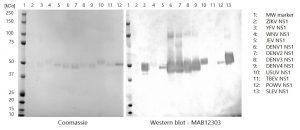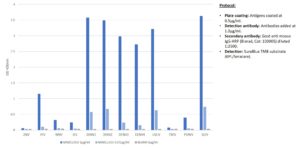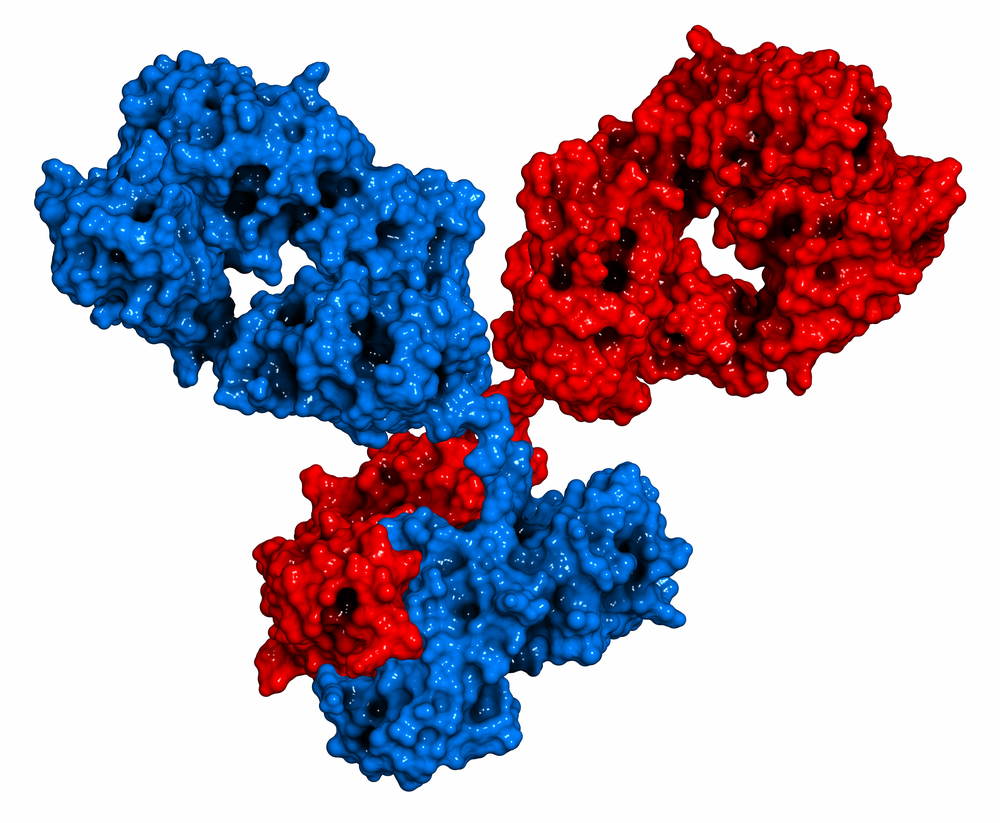
SDS-PAGE and Western blot: 100ng of flavivirus NS1 antigen was separated by SDS-PAGE, in reducing conditions. Proteins were transferred using Transblot for 7 minutes at 25V. 5% dry milk in PBS-T was used as blocking buffer and dilution buffer for antibodies. Primary antibody was diluted 1:1000, and goat anti-mouse-IgG-HRP secondary antibody (Biorad 103005) was used at 1:1000. All steps were carried out for 1h at room temperature with gentle rocking. KPL Membrane TMB was used for detection. Development time ~30 seconds.
MAB12303 recognises NS1 antigen for all four Dengue virus serotypes (DENV1-4), Yellow fever virus (YFV), Usutu virus (USUV) and Saint Louis encephalitis virus (SLEV).

Direct ELISA: Antibody recognises DENV1-4, YFV and SLEV NS1 proteins by direct ELISA. Cross-reactivity profiles may differ, depending on conditions are used.
MOUSE ANTI-DENGUE VIRUS PAN-SEROTYPE NS1 ANTIBODY (FG10)
This mouse anti-Dengue virus pan-serotype NS1 protein antibody (FG10) recognises the NS1 protein of a broad range of flaviviruses.
PRODUCT DETAILS – MOUSE ANTI-DENGUE VIRUS PAN-SEROTYPE NS1 ANTIBODY (FG10)
- Anti-Dengue NS1 antibody (FG10) recognises Dengue virus serotypes 1-4.
- Immugen was a pool of NS1 proteins from all four Dengue virus serotypes.
- Antibody also recognises NS1 from Yellow fever virus (YFV), Usutu virus (USUV) and Saint Louis encephalitis virus (SLEV).
- Antibody recognises DENV1-4, YFV and SLEV NS1 proteins by direct ELISA. Cross-reactivity profiles may differ, depending on conditions are used.
BACKGROUND
NS1 is a major non-structural protein expressed by the Dengue virus. The NS1 monomer is a glycosylated protein of approximately 45kD, which associates with lipids and forms a homodimer inside infected cells. It is necessary for viral replication, and is also secreted into the extracellular space as a hexameric lipoprotein particle, which is involved in immune evasion and pathogenesis by interacting with components from both the innate and adaptive immune systems, as well as other host factors. NS1 is one of the major antigenic markers for viral infection with Dengue.
Dengue fever is ranked by the World Health Organization (WHO) as the most critical mosquito-borne viral disease, globally. More than 40 percent of the world’s population, in more than 100 countries are at risk of dengue infection. The most significant dengue epidemics in recent years have occurred in Southeast Asia, the Americas and the Western Pacific. Each year, an estimated 390 million dengue infections occur around the world. Of these, 500,000 cases develop into dengue haemorrhagic fever – a more severe form of the disease, which results in up to 25,000 deaths annually.
With more than one-third of the world’s population living in areas at risk of transmission, dengue infection is a leading cause of illness and death in the tropics and subtropics (WHO for Guidelines for Diagnosis, Treatment, Prevention & Control, 2009). As many as 100 million people are infected yearly. Dengue is caused by any one of four related viruses transmitted by mosquitoes. There are no vaccines available to prevent infection with dengue virus.



